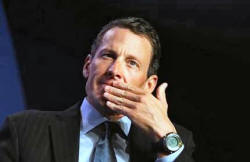|
 Armstrong
made 'a scapegoat' by USADA, says McQuaid Armstrong
made 'a scapegoat' by USADA, says McQuaid
 Send a link to a friend
Send a link to a friend
[January 28, 2015]
(Reuters) - Banned cyclist Lance
Armstrong was the victim of "a witch hunt" and made a scapegoat by the
United States Anti-Doping Agency (USADA), says former International
Cycling Union (UCI) president Pat McQuaid.
|
|
 A cancer survivor and once a hero to millions, Armstrong was
stripped of his seven Tour de France victories and banned for life
from racing in 2012 by USADA after it accused him in a report of
engineering one of the most sophisticated doping schemes in sports. A cancer survivor and once a hero to millions, Armstrong was
stripped of his seven Tour de France victories and banned for life
from racing in 2012 by USADA after it accused him in a report of
engineering one of the most sophisticated doping schemes in sports.
"He was very much made a scapegoat, there was a witch hunt after
Armstrong," McQuaid told BBC Radio 5 live on Tuesday, before adding
that he had "a certain sympathy" with the American.
Irishman McQuaid, UCI president from 2006 to 2013 before being
replaced by Brian Cookson, made his comments a day after Armstrong
had told the BBC he would not have needed to resort to doping in the
sport's current era.
Following his return from cancer in the late 1990s, Armstrong was
regularly subjected to claims of doping, which he stoutly refuted
until the release of USADA's "reasoned decision."
 The 200-page document -- supported by a further 1,000 pages of
evidence -- finally led to Armstrong's confession in an interview
with Oprah Winfrey in January 2013.
"That's the way it was," said McQuaid. "USADA wanted a big name.
They weren't really interested in the smaller riders and also they
made deals with the smaller riders in order to get the information
they needed on the big guys.
"I can have a certain sympathy because I don't think in sport,
people in those situations, I think they should be treated equally."
[to top of second column] |

On Monday, Armstrong said he regretted the "unacceptable and
inexcusable" behavior with which he subjected other riders and
figures within the sport during numerous attempts to rubbish their
allegations of doping.
"I would want to change the man that did those things, maybe not the
decision, but the way he acted," he continued.
"The way he treated people, the way he couldn't stop fighting. It
was unacceptable, inexcusable."
Armstrong's seven Tour victories between 1999 and 2005 have been
rescinded but not assigned to anyone else because of the prevalence
of doping at the time.
(Reporting by Mark Lamport-Stokes in Scottsdale, Arizona; Editing by
Frank Pingue)
[© 2015 Thomson Reuters. All rights
reserved.]
Copyright 2015 Reuters. All rights reserved. This material may not be published,
broadcast, rewritten or redistributed.
 |